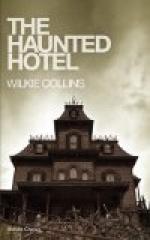Outside the church door stood the three or four members of the club who, like Doctor Wybrow, had watched the ceremony out of curiosity. Near them was the bride’s brother, waiting alone. He was evidently bent on seeing the man whom his sister had spoken to, in broad daylight. His bold eyes rested on the Doctor’s face, with a momentary flash of suspicion in them. The cloud suddenly cleared away; the Baron smiled with charming courtesy, lifted his hat to his sister’s friend, and walked off.
The members constituted themselves into a club conclave on the church steps. They began with the Baron. ‘Damned ill-looking rascal!’ They went on with Montbarry. ’Is he going to take that horrid woman with him to Ireland?’ ’Not he! he can’t face the tenantry; they know about Agnes Lockwood.’ ‘Well, but where is he going?’ ‘To Scotland.’ ‘Does she like that?’ ’It’s only for a fortnight; they come back to London, and go abroad.’ ’And they will never return to England, eh?’ ’Who can tell? Did you see how she looked at Montbarry, when she had to lift her veil at the beginning of the service? In his place, I should have bolted. Did you see her, Doctor?’ By this time, Doctor Wybrow had remembered his patients, and had heard enough of the club gossip. He followed the example of Baron Rivar, and walked off.
‘One step more, you see, on the way to the end,’ he repeated to himself, on his way home. ‘What end?’
CHAPTER IV
On the day of the marriage Agnes Lockwood sat alone in the little drawing-room of her London lodgings, burning the letters which had been written to her by Montbarry in the bygone time.
The Countess’s maliciously smart description of her, addressed to Doctor Wybrow, had not even hinted at the charm that most distinguished Agnes—the artless expression of goodness and purity which instantly attracted everyone who approached her. She looked by many years younger than she really was. With her fair complexion and her shy manner, it seemed only natural to speak of her as ‘a girl,’ although she was now really advancing towards thirty years of age. She lived alone with an old nurse devoted to her, on a modest little income which was just enough to support the two. There were none of the ordinary signs of grief in her face, as she slowly tore the letters of her false lover in two, and threw the pieces into the small fire which had been lit to consume them. Unhappily for herself, she was one of those women who feel too deeply to find relief in tears. Pale and quiet, with cold trembling fingers, she destroyed the letters one by one without daring to read them again. She had torn the last of the series, and was still shrinking from throwing it after the rest into the swiftly destroying flame, when the old nurse came in, and asked if she would see ’Master Henry,’— meaning that youngest member of the Westwick family, who had publicly declared his contempt for his brother in the smoking-room of the club.




